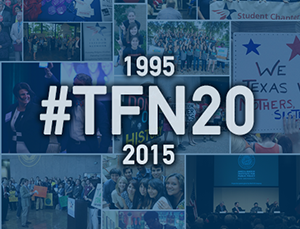Republican presidential candidate Ben Carson said this past weekend that he would oppose the election of a Muslim as American president because Islam (he believes) is in conflict with the the Constitution. But today we read that while Carson has a personal religious test for candidates seeking the presidency, he failed a similar religious test earlier this year.
Talking Points Memo reports that a Texas pastor was among critics who earlier this year strongly protested an invitation for Carson to speak at a Southern Baptist Pastors’ Conference. Their concerns? They thought Carson’s personal religious beliefs are theologically suspect.
In particular, critics complained that Carson’s membership in the Seventh-Day Adventist Church was a problem. Bart Barber, a Southern Baptist pastor in Farmersville just northwest of Dallas, was one of the critics. Here’s part of what he wrote in a blog post last spring:
“Southern Baptists have classified Seventh-Day Adventists not as a church but as a sect. We have stopped short of anathematizing them, but we have identified aspects of their beliefs that are sub-Christian and harmful.”
Following those kinds of complaints, Carson was essentially disinvited from speaking at the event.
This isn’t the first time a Republican’s religious beliefs got him in trouble with religious-righters who make up the base of the GOP. You might recall that Mitt Romney’s Mormonism caused heartburn among conservative evangelical Christians during the Republican presidential nomination contest in 2012. Dallas pastor Robert Jeffress, for example, characterized Mormonism as a non-Christian cult (although he held his nose and supported Romney in the general election campaign against President Obama). In his March blog post, Barber also calls Mormonism a cult.
We won’t get into the theological differences between Southern Baptists and Seventh-Day Adventists (or Mormons). We also won’t criticize people of faith who want only members of their own religious denomination to serve as speakers at their religious events. That’s their right.
We’ll simply point out the wisdom of our nation’s founders in insisting that the Constitution prevent government from favoring or disfavoring religion or any particular religious faith. While voters may base their balloting decisions on any reasons they choose, government is rightly bound by the constitutional principles of separation of church and state and no religious tests for public office. We should all be thankful for that, regardless of our religious beliefs.


8 Comments
I’m not a Seventh-Day Adventist, but I’m not really interested in debating the merits of Adventist beliefs and practices. What concerns me much more about Ben Carson as a candidate for elected office is that almost all his opinions about politics and current events are ill-informed, highly prejudiced, and often factually incorrect.
When you enter Republican politics, the fantasy-prone part of your brain kicks into high gear and you lose rationality and mental stability. Carson was once an exceptional pediatric surgeon and look at him now.
I guess he’s living proof that a person can be very smart in one area while being really stupid in another.
To my way of thinkin, the SBC is not only a cult butI rank them down there with Scientology!
Actually, the more I read and think (yes, I actully take time out to THINK) I have to come to the conclusion that Christianity is a first class cult.
Man made a god out of Jesus 325 years after he was dead. When men make a god it is called an idl. Since most Christians have never bothered to actually READ their books but make decisions based on their man-made god, then it is called idolatroy.
I could care less what someone wants to believe or not believe. If you want to worship a 1938 Oldsmoble, fine with me.
Christians disregard most of what their god told them. They DEMAND the ‘RIGHT” to pray in public when Jesus told them not to do that. I could blather on and on but it is a bit like why did the chicken cross the road? It is meaningless.
For many Fundies, any belief system that conflicts with theirs is a “cult.”
I suspect they don’t really understand the meaning of the word “cult.”
A “sect.” Really? Well, that’s a nice term for a smaller denomination. I have seen Fundamentalist books and Southern Baptist literature call Seventh-Day Adventism a “cult.” Now that’s insulting. The books also called the following religions “cults”: Jehovah’s Witnesses, Church of Latter Day Saints (Mormons), Bahai Faith, Unity Church, Theosophy, Christian Science, Scientology (sorry, that really IS a cult!), Wicca, Odinism, and many others, even including Ethical Culture and Unitarian Universalism. I suppose the Fundies would term the relatively new Church of Freethought to be a cult (there are two large and vital congregations in Texas). At least the Fundies can’t call my philosophy, Secular Naturalistic Humanism, a cult. Can they?
Excellent. Thank you.
“Sub - Christian??”
Did he really write that?